Last time Ange conclusively cut ties with magic. For a time, anyway.
The next chapter opens in Maria’s bedroom. Sakutaro is asking Maria if he really is a stuffed animal, and that’s why he can’t talk to her.
Last time I assumed the scene with young child!Ange and Maria, which used the Kuwadorian backdrop, was in some sort of alternate dimension of the Mariage Sorcière. But now I’m starting to think this really happened, and Ange did not remember it since she was very young?
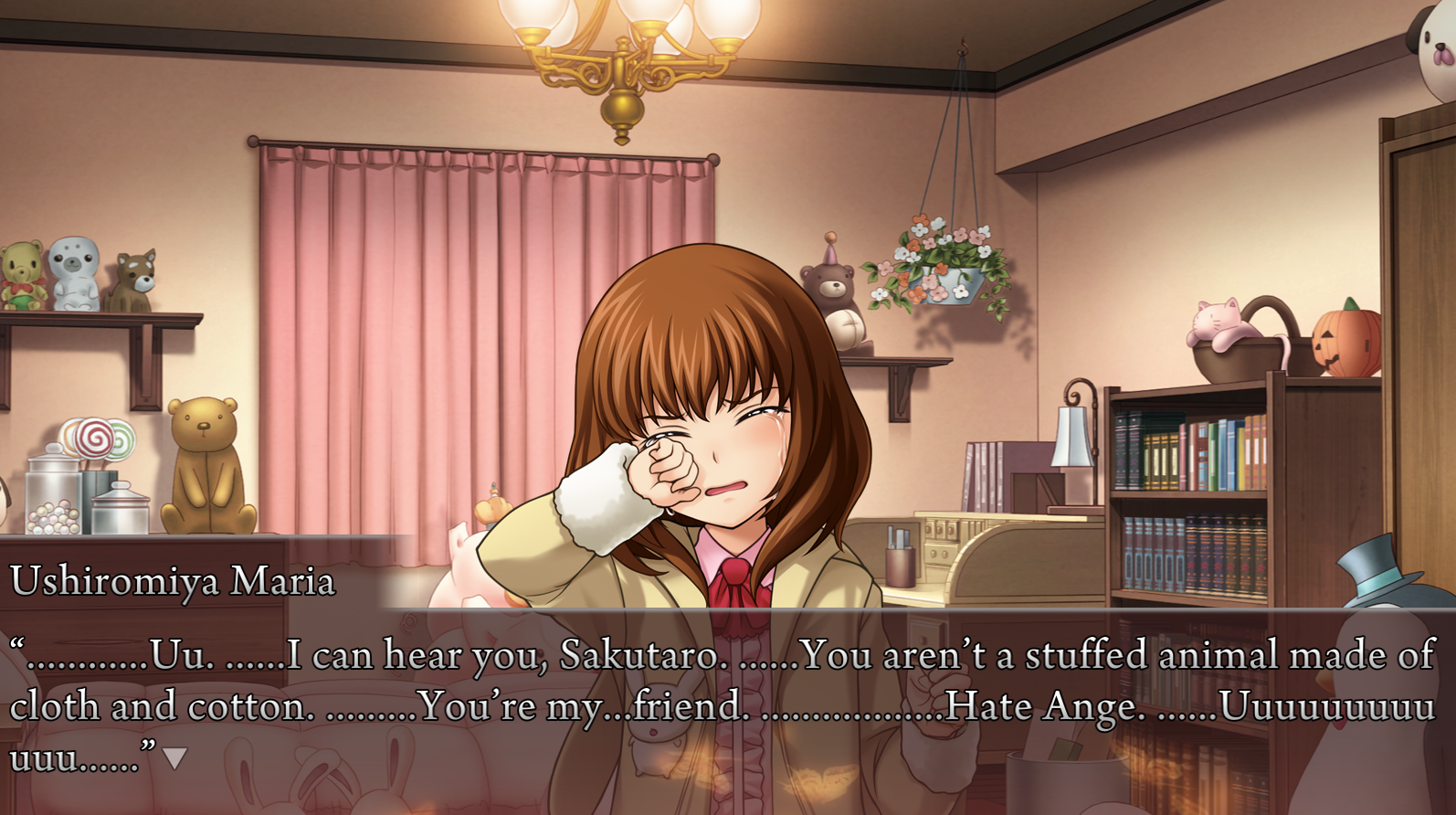
We get the name of a few of Maria’s other stuffed toys: Sakusuke and Sakukichi and ‘the animal band’. But it seems that Ange was the only human friend that Maria had, and now she feels that bridge is burned. The other friends, she has to keep a secret. Sakutaro tells her how to hide the four rabbits from the ‘forest band’ in her pockets. As for humans…
Maria: I won’t let any more humans come into my world. ……Mariage Sorcière is an alliance only between me and Beatrice.
So Maria goes through life, maintaining relationships with only her magic furniture, and developing a theory of the anti-magic toxin in Rosa and her teacher to explain why they can’t see. She contrasts them with workers at a construction site who are willing to indulge Sakutaro’s existence.
We get a scene at the konbini with the shop owner talking to Maria about her various friends while his assistant deals with the other customers. It seems like a well-established routine.
Sakutaro in these scenes takes almost like a surrogate parent role, not just consoling Maria when she’s sad but also advising her to eat healthily.
But of course, no sweet happy scene in Umineko can last! Maria gets home and finds she’s lost her key somewhere on the way back from the shop. This triggers the same kind of meltdown we’ve seen before in the flower scene (and with the same sad cello to accompany it!). Sakutaro, once again playing the ‘adult’ role, gently encourages her to go back and look.
On the materialist interpretation that Maria is ‘playing’ Sakutaro (either physically or in her head), she has an impressive ability to switch affects and carry both sides of a conversation. But I suppose she is imagining what she wants someone to say in this situation, in Sakutaro’s mouth.
Maria makes two trips back to the konbini, not finding the key. The second time, the store owner suggests talking to the cops. Maria has been advised not to speak to cops, primarily out of Rosa’s sense of shame at leaving her alone so often. But after Maria walks home and back a third time, konbinisan calls a cop himself.
The cop attempts to strike up a rapport with her. Maria is reluctant to give him Rosa’s contact details, but he takes her to a police box and warms up her food. She gives up Rosa’s contact details, despite her eminently plausible fear that Rosa will get mad.
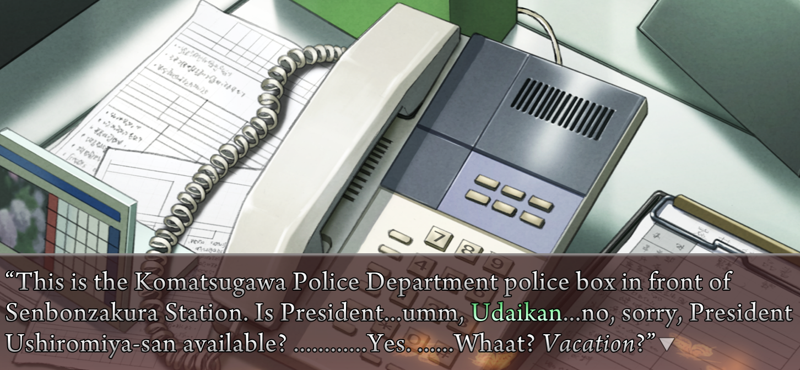
The call gives us some interesting details. We get some placenames for one…
- Komatsugawa (小松川) seems to refer to an area of Tokyo, which gives its name to a road system and a park. There is indeed a Komatsugawa Police Station.
- ‘Senbonzakura’ (千本桜) is literally ‘a thousand cherry blossoms’. It seems to be something of a set phrase, usually referring to places where you can see a (metaphorical or literal) thousand cherry trees, such as Hitome Senbonzakura in Miyagi and Takada Senbonzakura. There is indeed one in Komatsugawa. Here’s a video of someone walking there.
However, so far as I can tell there isn’t a Senbonzakura Station, nor a police box outside of it.
Our cultural note here is something else entirely…
“Udaikan” is a misreading of the “Ushiromiya” kanji (右代宮).
The officer mistook the last kanji 宮 (miya) for 官 (kan).
This would also have caused him to pick the wrong reading for 代 due to the existence of the word 代官 (daikan, magistrate).
This is a fascinating little touch of realism.
Anyway the most important information is actually that Rosa isn’t even at work, but taking a holiday! Wow! I mean not wow because we’ve already seen Rosa pull a stunt like this but still. (I’m not entirely sure under what circumstances Maria met Ange if this is continuing the story we had with her earlier.)
Since she can’t go home, they take her to the police station. There, Maria meets a ‘district welfare officer’ (民生委員) who calls her 可哀想に, ‘you poor thing’. Sakutaro denies this.
We skip forwards to Rosa’s return. The welfare officer is now on this blatant case of parental neglect, but Rosa pushes back. Despite seemingly wanting nothing to do with Maria, Rosa can’t stand to have her go to a daycare. She even tries to play a card of ‘that child that everyone’s seen wasn’t Maria’.
Rosa:「どうしてうちの子だとわかるんですか!!子どもなんて町中にいくらでもいるじゃないですか!!勝手にうちの真里亞だと決め付けないで下さい!!」
Rosa: How do you know that was my child?!! Children are dime a dozen around town! Don’t just assume that it’s my Maria!
Really nice translation there. The phrase being translated as ‘dime a dozen’ comes from 子どもなんて—literally “someone like ‘a child’”, with a disdainful tone—and いくらでも, meaning as many as one likes, an arbitrary amount. Then じゃないですか is roughly ‘aren’t there’. So ‘children are dime a dozen’ really cleverly catches the nuance while still sounding idiomatic in English.
Speaking of idioms, Rosa has apparently not heard the one that goes “if you’re in a hole, stop digging”. I wonder what the Japanese equivalent of that is? In any case, she continues to simultaneously deny and throw out random accusations at the people who treated Maria with kindness. She even blatantly lies when she’s called on taking a holiday. She repeatedly has a go at the cop for intruding on her private family matters. In short, she’s the picture perfect ‘abuser who got caught’.
The cellos come in as Rosa notices Maria, so you know something horrible is about to happen. She fixates on Sakutaro as the line of evidence that identified Maria to the cop, and starts berating Maria for taking Sakutaro out with her.
The welfare officer finally does something—the narration says she puts Rosa in a full nelson, although that seems rather unlikely. Rosa throws her off. Meanwhile Maria and Sakutaro are both trying to sacrifice themselves for the other. To Rosa’s POV, of course this is Maria alternating between her own voice and playing the role of Sakutaro. The idea that Maria could play like this in front of other people provokes yet another round of this.
This is painful to read, guys. I think we know why we didn’t hear about Sakutaro before this episode now.
The cop proves singularly useless at stopping Rosa’s rampage. Rosa discovers that Maria has been taking the rabbits to school, and we get a cultural note about communication booklets (連絡帳) used to pass messages between parents and teachers. Thanks to the booklet, Rosa was told about the toys, but she assumed it was ‘faultfinding’ by the teacher (seems to be based on それは教師の難癖だと一蹴し), and gave them the old Rosa treatment with a one hour meltdown about how dare they accuse her daughter etc. etc. The school—facing complaints from other students that only Maria could bring toys—resolved this by making a token effort to tattle to Rosa and then completely giving up. (Of course, they could easily have just done away with the ‘no toys in school’ rule, but lol.)
For Rosa, everything is about shame. She’s so fucked up by that Ushiromiya upbringing that she’s completely consumed by the idea of public image, she views Maria as an extension of herself that will reveal all of her secret failures, and she she is oblivious that her own meltdowns reflect far worse on her than having an extremely sweet autistic kid.
What I’m wondering at this point is why the cops let her keep Maria. Is it just that she’s rich?
Anyway, in an echo of Ange’s massacre of the Seven Sisters last chapter, Rosa starts smashing Maria’s friends. Making sure to say this first…
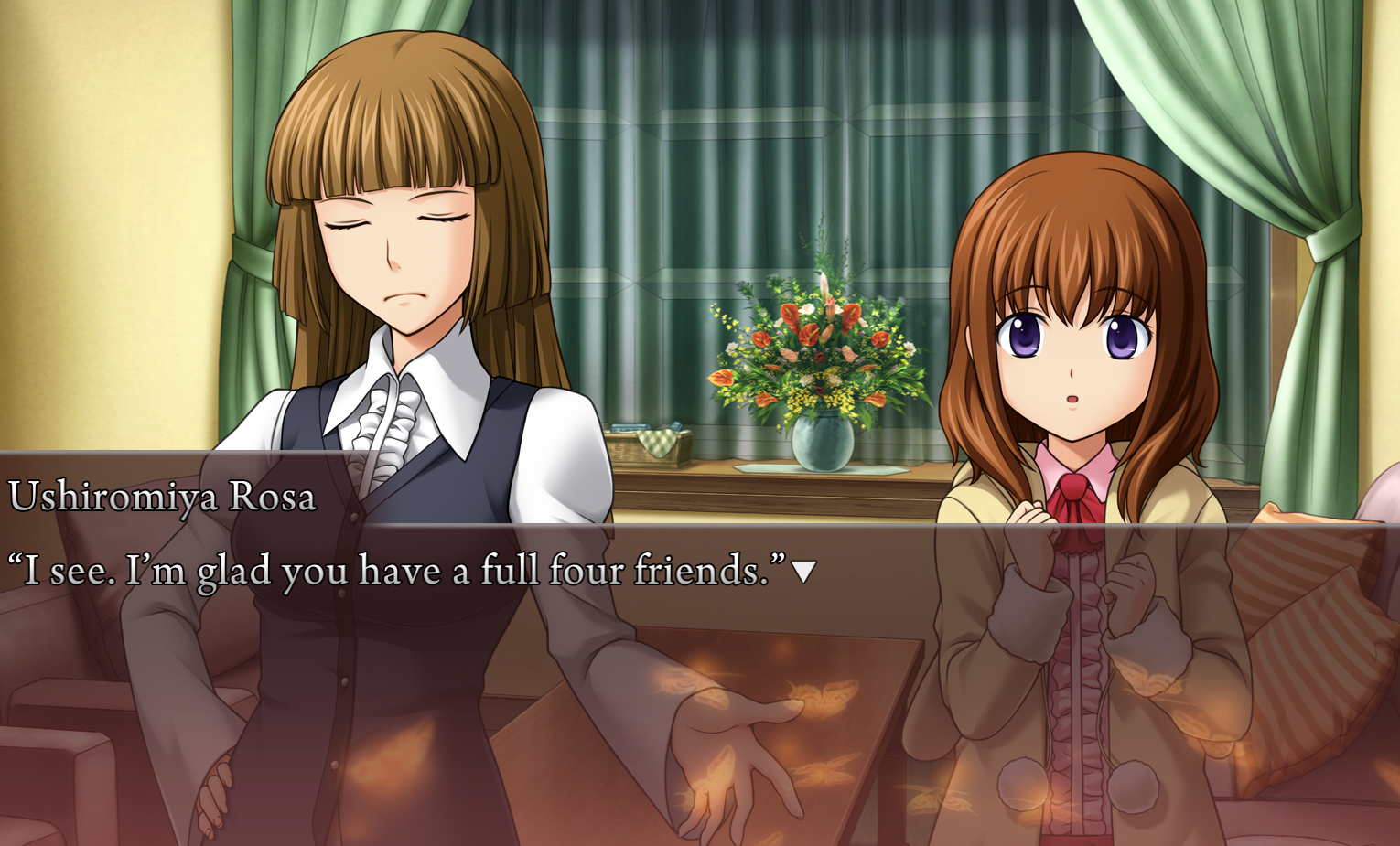
Then she kills a rabbit and threatens to go through the other ones if Maria doesn’t obey her.
Honestly, as far as the adult Ushiromiyas go, the worst one is “whichever one last did something”, but Rosa’s outright sadism towards Maria really puts her up there. The other Ushiromiyas are no less cruel, but they mostly pick on each other, people their own size.
The cop has a go at Rosa. “You……you call yourself a mother after doing something like that?!!” Yeah, I’m sure yelling at her will fix this. I mean big shocker, cop is absolutely useless at preventing violence, but lol, god. Has she never had to deal with an abusive parent before? She is actively making the situation worse.
Sakutaro speaks up; Rosa tears into Maria for having her only friend be a ‘disgusting’ stuffed animal—the stuffed animal that she made, no less. She victim-blames Maria for her bullying and repeats the ‘grow up’ line. Once again, this is painful to read.
So the inevitable happens. Rosa tears Sakutaro apart.
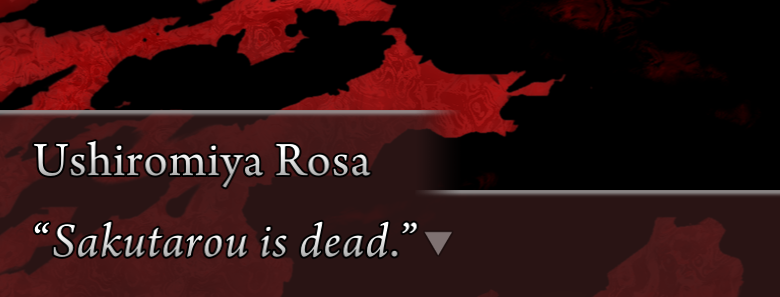
Rosa: さくたろうは、死んでしまいました
Stop crying! Look at this verb conjugation!
Rip to a real one, Sakutaro.
Maria goes nonverbal, represented by a dialogue box that says…
まばがぎゅりいを、ゆがべだ。
mabapennedbisgeck
A direct transliteration of the Japanese is… mabagagyuriio, yugabeta. So I assume there are snatches of words in there.
At this point Beatrice intervenes!
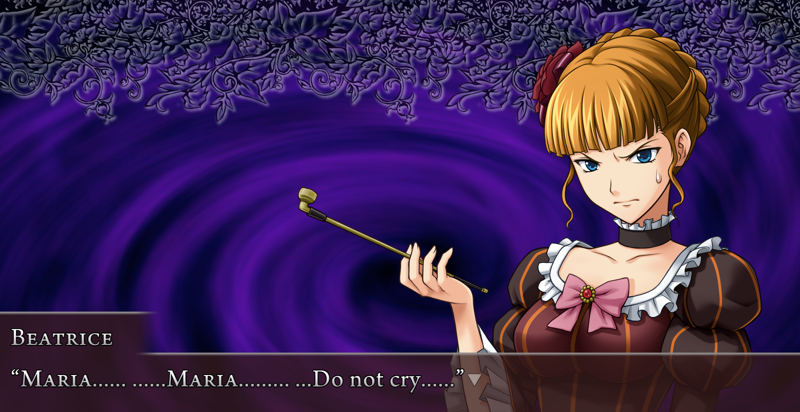
And, oh shit, it’s clicking together now. Beatrice is untouchable, and thus the only one of Maria’s friends who Rosa cannot destroy. No wonder Maria is so fixated on her. Goddamn…
Just as Ange begged the Seven Sisters to kill her tormentors, Maria begs Beatrice to resurrect Sakutaro, and Beatrice can only present an excuse. This one is that Sakutaro is Maria’s furniture, not hers, so he’s hard to resurrect. Maria is like, oh, but you have Endless Magic. So then Beatrice argues that since Rosa was the one to destroy Sakutaro, and the one to make him…
Beatrice: ……A life that is not permitted by its own mother cannot exist…
Bullshit lmao. You made that up on the spot. Or, I guess, from an ‘Ange POV’, Maria came up with that one on the spot, which is really really sad.
Beatrice says, believe in Sakutaro coming back, and that will become magic. It’s feeble; Maria says it’s not even magic. And she finally admits to herself that Rosa might be kind of a bad person…
Maria: Hate Mama, hate Mama…!! Can’t stand it, can’t stand it, it’s too much, it’s too much…!! Want to twist Mama up like she did to Sakutaro…! Want to stick my fingernails in and tear her, turn her into cloth and cotton!!
Beatrice says… if the alternative is Maria tearing herself apart, then she will teach her the destructive magic: “the abyss in the world of witches, the depths where no light reaches……”
The chapter ends with Maria swearing her hatred of all the world, but especially Rosa (or the witch possesing Rosa) and Ange.
Fwoof.
‘Rosa child abuse chapters’ tend to be some of the most impactful in Umineko. I assume this is drawing on Ryuukishi’s all too real observations as a social worker, which is why this chapter is full of especially concrete little details.
What I’m wondering is why the police didn’t forcibly separate Rosa and Maria after that little display in front of a cop, on top of the established neglect. I started wondering what Japan has in the way of Child Protective Services; the answer seems to be 社会的養護 (social care); I found a page here with information about it in English. It does appear the state has the legal power to take a child away from a parent.
Did Rosa just put in a bunch of bribes? Did she move? Maybe we’ll find out later.
Anyway, the point of all this is not merely to show us an appalling episode of child abuse. There’s a reason this chapter stays in Maria’s POV the entire time, and presents Sakutaro as entirely real. In the broader discussion of magic, and the different ‘truths’ that can simultaneously exist, it is vitally important to show what a big deal it is to kill Sakutaro in Maria’s world. Rosa, as cruel as she is, seems to think it’s just a game to Maria, and that speaking as Sakutaro is just an affectation for Maria. She is painfully to find the shred of imagination, ‘empathy’ perhaps, for how Maria must experience her actions—and when pushed, her immediate thought is “well what about me then?”
So this chapter is perhaps a caution. We are presumably about to come back to Rokkenjima before too long, and in taking a brute-empiricist dismissive worldview we will be acting towards… someone as Rosa did towards Maria.
Of course, it’s a tricky line to walk. Sometimes it is necessary and kind to tell someone that the world isn’t how they perceive it. If someone’s torturing themselves with a self-hatred belief system (very common in my experience), gently but firmly insisting that that’s not how things are, and offering alternative framings, may be the thing they need from you to find their way out of the maze. But context is everything.
I think there have been times when I’ve been a little like Rosa. Not in terms of sadistically breaking people’s stuff! But there have been times when I’ve judged some important part of someone’s habitus as an annoying affectation, partly out of a sense of shame and responsibility for them. I’m trying to not do that again.
But even with a certain amount of understanding, we can say this. Rosa is unable to face up to the fact that she has meltdowns that terrify her daughter. She won’t even acknowledge it, and she blows up at anyone who tells her she’s out of line, so she can’t possibly look for ways to contain her anger or attempt to unpick that hot psychological mess. Like many abusers, she goes through honeymoon periods where she attempts to dote on her victim to make up for the abuse, as if there is a ledger somewhere that can be balanced out. Of course the inconsistency just makes it worse. To Rosa, she’s a reasonable person who’s just been pushed by unreasonable behaviour, and Maria is just refusing to understand.
Rosa is, realistically, not likely to unpick this on her own. Unfortunately there is basically nowhere else for Maria to go outside of the state foster care system, and that has its own problems. Even so, she might well be better off there than with Rosa. There is nothing wrong with speaking in a funny voice and forming relationships with stuffed animals, and if Maria got to grow up instead of being murdered, we could hope that eventually she could find some kind of companionship and support from someone who understands that. But… it’s bleak.
Anyway Sakutaro’s dead! In fact so far the death list is all seven Sisters of Purgatory, one of the four members of the rabbit band, and Sakutaro. Quite a change of pace!
We’re almost halfway through this episode and almost nothing has happened on Rokkenjima yet. I wonder if we will go back there at all, or if this entire episode will be Ange-and-Maria-focused. Guess we’ll find out this time. Thanks for reading, and <see you next time!> where we will return to Ange 12 years later!
Comments